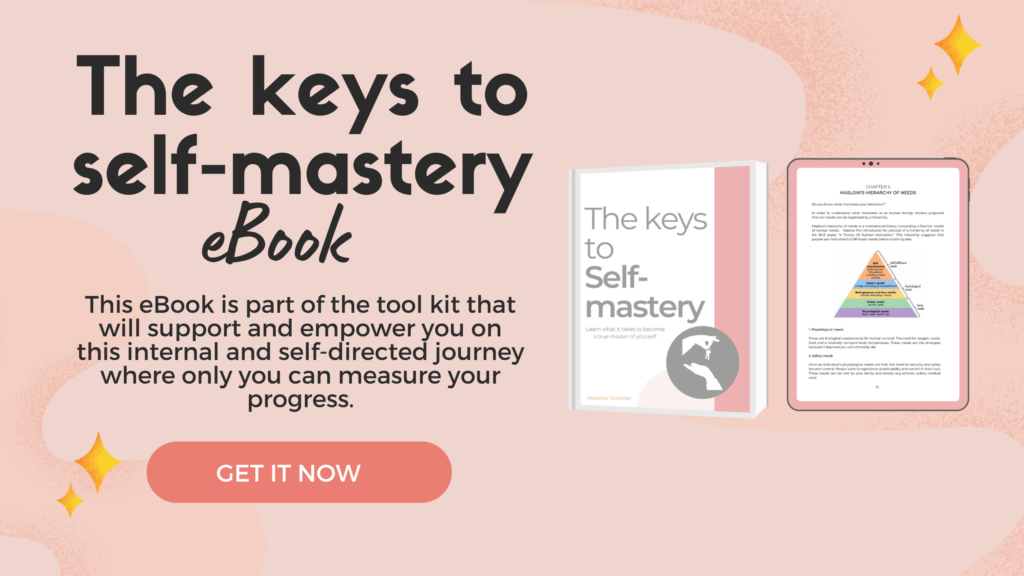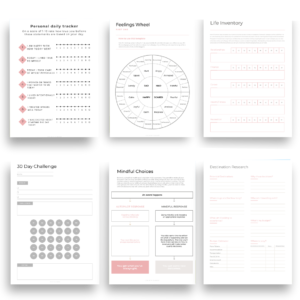
In a world that often emphasises the value of social connections, there’s an important distinction to be made between being alone and feeling lonely.
Many people associate solitude with a sense of isolation or sadness, but the truth is that being alone can be a fulfilling and rejuvenating experience. 😊
In this blog post, I will explore the nuances of being alone versus feeling lonely, understanding the importance of solitude, and embracing the positive aspects of both states.
Let’s get to it. 💕
The Difference Between Being Alone and Feeling Lonely:
Being Alone:
Being alone is a state of physical solitude, where you find yourself without the company of others. It can occur by choice or as a natural consequence of circumstances. Spending time alone provides an opportunity for self-reflection, relaxation, and personal growth.
It allows you to engage in activities that bring you joy, pursue hobbies, or simply enjoy a moment of peace. Being alone can be a deliberate choice, a time to recharge and connect with oneself. 🥰
Feeling Lonely:
Loneliness, on the other hand, is an emotional state that arises from a perceived lack of meaningful connections. It’s possible to feel lonely even in a crowded room if the connections are superficial or unfulfilling.
Loneliness is often characterised by a sense of emptiness, isolation, or a longing for deeper human connections. It’s a complex emotional experience that can impact mental and physical well-being. 😟

Embracing the Positive Aspects of Being Alone:
1. Self-Discovery:
Being alone provides an opportunity for self-discovery. It allows you to explore your thoughts, feelings, and interests without external influences. Use this time to reflect on your goals, values, and aspirations. Self-discovery is a crucial aspect of personal growth and can lead to a deeper understanding of oneself.
2. Independence:
Embracing solitude fosters independence. When you’re comfortable being alone, you become more self-reliant and less reliant on others for your happiness. This independence can empower you to make decisions based on your own needs and preferences, leading to a more authentic and fulfilling life. 🥰
3. Creativity:
Solitude often sparks creativity. When you’re alone with your thoughts, you have the mental space to generate new ideas, think critically, and engage in creative pursuits (yaay). Many artists, writers, and innovators find inspiration in moments of solitude, leading to the creation of meaningful and impactful work. 🎨
4. Rest and Rejuvenation:
Being alone allows for rest and rejuvenation. In a world filled with constant stimuli, taking time for solitude can be a form of self-care. It provides an opportunity to relax, recharge, and focus on activities that bring you peace and joy, contributing to overall well-being.

Addressing the Challenges of Feeling Lonely:
1. Cultivating Meaningful Connections:
If loneliness arises from a lack of meaningful connections, focus on cultivating relationships that nourish your soul. Seek out individuals who share your values and interests. Join clubs, organisations, or communities where you can meet like-minded people. Focus on getting yourself out there. Quality connections are often more fulfilling than a large social circle. 🫂
2. Volunteering and Giving Back:
Engaging in volunteer work or contributing to your community can alleviate feelings of loneliness. By helping others, you not only make a positive impact on the world but also connect with individuals who share a common purpose. Volunteering provides a sense of belonging and fulfillment.
3. Seeking Professional Support:
If loneliness becomes a persistent and overwhelming emotion, maybe consider seeking professional support. A therapist or counselor can provide guidance and a safe space to explore the root causes of loneliness. Addressing these issues with professional help can lead to a more fulfilling and connected life. 🫶
Finding Balance:
The key to a fulfilling life lies in finding a balance between being alone and fostering meaningful connections. Embrace solitude as a time for self-discovery, creativity, and rejuvenation. At the same time, actively cultivate relationships that bring joy and fulfillment. Recognise that both states are essential for a well-rounded and satisfying life. 💕
Conclusion
Being alone and feeling lonely are two distinct experiences, each with its own set of opportunities and challenges. Embracing solitude allows for self-discovery, independence, creativity, and rest. However, if loneliness creeps in, it’s crucial to address it by cultivating meaningful connections, volunteering, or seeking professional support. You are not alone. ❤️
Understanding the nuances between being alone and feeling lonely empowers you to navigate both states with intention and purpose. Ultimately, finding a balance between solitude and social connections contributes to a rich and fulfilling life. Embrace the positive aspects of being alone, foster meaningful connections, and savor the journey of self-discovery in this beautiful dance between solitude and companionship.
Pin this post for a reminder 📌 👇

Related Blogs
Things to Say “No” to for you to Live a Happier Life
How to Stop Settling For Less Than You Deserve
How to Become the Best Version of Yourself: A Guide For 20-Somethings
Firstly, let’s establish the difference between what a habit is and what a routine is. For the longest time I didn’t think there was a difference as I thought both words meant “doing the same thing over and over again without thinking about it” but I was definitely mistaken.
Habit: An action we do often in a regular and repeated way
Routine: A regular way of doing things in a particular order
To call a behaviour a habit it needs to be undeliberate action. If the behaviour requires a high degree of intentionality and effort, it’s definitely not a habit. We all possess both good and bad habits that we barely give a thought about because … well… they’re habitual. However, have you ever thought about why you may have this habit?
We consider good habits those that are beneficial to our physical and mental health. Such as waking up early and going for your daily run and writing in your gratitude journal.
We consider bad habits those that are not beneficial to our physical or mental health such as smoking or unhealthy eating. Most of our bad habits are caused by stress and boredom.
Hands up if you’ve ever got up and went to the kitchen to go get something to eat just because you were bored… I know I sure have.
Having a routine is important because it can help us cultivate positive daily habits and prioritise important practices such as self-care, exercise and maintaining a healthy balanced diet.
No matter what annoying or stressful thing happens during the day, knowing that you’ll be having your evening meal at 6pm and watching your favourite show at 7:30pm can bring real comfort to our lives.

Everyone has their own special routine. You could probably list 5 things that you do every morning and evening without fail. It’s the tiny habits that we form in the course of our lives that makes us different from the people around us. These tiny habits may reveal some insights into your personality traits and how you approach life. I’m going to list a few common habits and what it may say about your personality if you do them!
Your eating habits
Yes! The way you eat actually reveals your personality and behaviour tendencies (Who knew huh?)
Here are the personality traits Ms.Boghossain ( A behavioural food expert) marks each type of eater.
Fast Eaters – Impatient, Ambitious, goal orientated
Slow Eaters – Sad, Confident, low energy
Picky Eaters – Anxious, neurotic, detailed
If you’re someone who likes to separate different foods on your plate you’re most likely very detail-orientated and very cautious in your everyday life.
Think about the last meal you ate. What category do you fit in?
Your punctuality
Are you one of those people who say “I’m on my way” but really you’re in the shower wondering what on earth you’re going to wear. Or are you the person who doesn’t need to send the “I’m on my way” message because you’re already at the meeting point waiting for people to arrive?
(I’m defo the second one)
Does our attitude towards time and punctuality say anything about our personality? Indeed, it does.
Research suggests that punctuality is a matter of preference that’s linked to a person’s innate behaviour trait.
Often/always being punctual shows:
⭐You can organise your time
⭐You are dependable.
⭐You are a realistic thinker
⭐You have discipline
Often/ Always not being punctual shows:
👉 You are disorganised
👉 More likely to be a daydreamer
👉 More emotionally driven
While being punctual normally implies that you have certain personality traits such as self-discipline and reliability. This doesn’t mean that people who have tendencies to be late definitely DO NOT carry these traits. However, it’s clear that your relationship with time can tell you a thing or two about who you are and what you value.
How often you use your phone
Millennials are by far one of the most active groups using mobile phones. Smartphones have provided us with the ability to access the entirety of the internet on the go at any given moment. They help connect us with friends and family from all over the world and deliver news to us at a moment’s notice. However, there are some negative side affects when it comes to excessive phone usage (just like with anything not done in moderation!)
One study looked at “The effect of iPhone separation” on the cognition, emotion, and physiology of young people who were asked to give up their phones for a little while. The participants weren’t allowed to answer their ringing phone while trying to complete a word search puzzle. The research showed that their heart rate and blood pressure increased, and the participants reported feelings of anxiety and unpleasantness.
These results show how hard millennials are finding to live their day to day lives without getting distracted by the pinging of their phones and the negative effects it has when restrictive usage is applied.
What excessive phone usage shows:
– Possible need for validation through social media
– Loneliness
– Lack of hobbies/ Interests
– Lack of emotional stability
What moderate/low phone usage shows:
– High productivity
– Organised
– Active social life (in real life)

Your spending habits
Yes my dear, how you use your coins can signal key traits about your personality. People use their money to express their individual preferences which can expose your habits.
“Your willingness to spend money seems to hinge upon one factor: how psychologically uncomfortable you feel when you have to part with your money, explains Cynthia Cryder, Associate Professor of Marketing at Washington University.
If you’re someone who has trouble spending money you’re more likely to:
✨Be an overthinker
✨Have more self-control
✨Have an issue letting go
If you’re someone that likes to splash that cash you’re more likely to be:
💰Carefree
💰Focus more on the present
💰Extravagant
These are just a few examples of what daily habits and routines say about your personality, did you notice any that you do? Let me know in the comments!
Related Blogs
Everything you need to know about habits
Habits – Small decisions you make and actions you perform every day.
We all have habits, both good and bad. Habit-forming starts from a very young age, whether it was taking a nap every day after school or writing in your diary every night.
What’s one thing you have to do before your day can start? Is it drink a cup of coffee or tea? Eat an apple from the fruit bowl on your kitchen counter?
These behaviours form a part of your daily routine through your repetitive actions. The way your life is right now is a sum of your habits Scientists say that habits emerge because our brains are constantly looking for ways to save effort. Your brain isn’t trying to be in overdrive every second of the day, it wants to chillax.
Left to its own devices the brain will and make almost any routine a habit.
Cue | Habit | Reward
The process of habit formation that happens within our brains is a three-step loop. First there is the cue, routine then a reward.
Cue: A trigger that tells your brain to go into automatic mode and start your habit.
Routine: The action of your habit which can be physical, emotional or mental.
Reward: Your brain is going to need that dopamine spike in order for your brain to figure out if this particular loop is worth remembering for the future.
Over time this three-step loop will become more and more automatic.
Let’s take for example a smoker. When a smoker sees a cue – a pack of cigarettes, their brain starts anticipating a hit of nicotine. The sight of cigarettes alone is enough for the brain to crave a nicotine rush. If it doesn’t arrive the craving grows until the smoker unthinkingly reaches for the cigarette packet.
How many day‘s does it take to build a habit?
You have probably heard that it takes 12, 21, 33 or 66 days to create a habit. While having a number assigned to it may be encouraging, it can also be misleading.
Here’s the truth: There’s no real timeline.
If you go into the habit-building process expecting the habit to be automated in 33 days and come day 34 and you’re still putting in a conscious effort to start your “habit” you’re going to feel deflated.
The time it takes to establish a habit varies from person to person and habit to habit. Whether it takes you 40 days or 80 days, the exact timeline doesn’t really matter. What will matter is that you’ve created a new habit that you were able to stick to no matter how long it took.
That’s something to be proud of.

1% improvement/ low bar high bar
Acquiring success does not require constant massive action. It’s easy to overestimate the power of one defining moment and not the value of making small improvements daily. Improving by 1% isn’t particularly noticeable but can be far more significant in the long haul. What starts as a small win accumulates into something greater than you can imagine.
It’s only when you look back years later that you see the value of the implementation of the good daily habits you started. This however can be a difficult concept to appreciate in daily life.
One healthy meal a day is better than not eating healthy at all. 10 minutes of reading is better than never picking up the book. 10 minutes of piano practice is better than none at all. It’s better to do less than you had hoped than nothing at all.
The most powerful outcomes of any compounding process are delayed. You need to be patient in order to see results.
You won’t notice how 10 minutes of reading is slowly expanding your brain and you won’t see the effects of 1 day at the gym. You have to believe that what you’re doing daily will pay off in the end.
Don’t let instant gratification get in the way of your results. Stay the course. Your daily 1% improvements determine the difference between who you are and who you want to be. It doesn’t matter how successful you want to be right now, what matters is whether your habits are putting you on the right path for success.
Do habits just disappear?
Habits never really just disappear into thin air. They still live in the structure of your brain which can be of huge benefit to us. Could you imagine having to re-learn how to ride a bike or drive a car every two weeks? That would be a complete nightmare. However, our brains aren’t able to distinguish between a bad habit and a good habit. So, your bad habits are sitting alongside your good habits just waiting for a cue.
How do habits change?
Habits are created by putting together a cue, a routine, and a reward and then cultivating a craving that drives the three-step loop.
There are no specific steps that are guaranteed to work for everybody, but what we do know is that a habit cannot be eradicated it must instead be replaced. If we keep the same cue and the same reward a new routine can be inserted. Almost any behaviour can be transformed if the cue and reward stay the same. For some habits however, there’s one other ingredient that’s necessary: belief.
Once you’re aware of how your habits work and recognize the cues and rewards, you’re halfway to changing it.
Changing habits is one of the most fundamental skills you can learn, as it allows you to reshape your life and reshape who you are.
Who wouldn’t want this transformational skill?

Why you should start small
You should start small so that your new normal adjusts without you noticing as much.
We all like the feeling of comfortability. When you’re used to a set of conditions, trying to deviate from them with a lot of changes will make you extremely uncomfortable. If you make small changes, you don’t notice it as much. After a while, you start to adapt to these small changes, and they become part of the conditions that you’re used to. This becomes your new normal. Changing your life in small steps rather than big ones sets you up for a better chance of succeeding as you are gradually changing to your new normal without much friction.
They’re easier to start
When you’re trying to make a big change in your life, it requires more brainpower, mental commitment, time and energy. If you’re someone like me who has a to-do list as long as their arm every week, then trying to find the time to add on new healthy habits can be difficult.
For example, if you make a mental note that you want to go to the gym for 2 hours every day you may achieve it for a couple of days (that’s if you remember that is) but it will take an extraordinary amount of effort on your part.
A small change for this example could be to plank 1 minute a day as soon as you wake up. Doing this makes it much easier to get started. You could start doing it right now in the middle of this blog post!
You then gradually build up to your end goal, which won’t be as daunting as you would have already built a habit related to it. Also known as “Micro habits” – A really small action that requires minimal motivation or effort to complete.
Remember: Making a habit easy to begin with will make it more likely to do it.
They’re easier to sustain
Let me give you an example:
If you’re someone who usually wakes up at midday but want to switch up your routine and start waking up at 5:30am straight away you’re going to have a VERY hard time trying to sustain that. You may last 1 or two days but that’s not creating a habit, it’s creating a fad. For you to make a drastic step in your sleep routine you need to gradually wake up earlier and earlier each day. Whether it’s 15 minutes, 20 minutes, or 30 minutes.
This type of practice can work in every situation. Whether you’re trying to go to the gym more often or trying to eat healthier. These small increments will make it much easier to sustain than going from 0-100.
When you attempt to create new habits and change old ones there will be times when you will have failed attempts. Don’t see it as a failure of you as a person but a way to learn more about yourself and what to do differently next time.
There will be a lot of trial and error but you won’t know until you try and see what works for you. The people who succeed at habits aren’t the people who never fail- they are the people who keep going after they fail.
What habit are you currently trying to develop?
Related blogs:
How to improve your life one day at a time
How to create the best daily routine
How to raise your standards and live your best life
We all want to be and feel successful. People chase money, fame, power and hundreds of other things without taking a step back to think: What does success mean to me?
Take the quiz here > What does success mean to you.
If you take a look at social media for a few minutes, you’ll realise that most people have a narrow view of what having a successful life is like. They think it’s about having a large social media following, luxury cars and owning a business worth millions. There’s nothing wrong with striving for these things but being like them won’t necessarily make you successful in the same area.
Success is subjective but the overall consensus is that you create a happy life for yourself. It can hold monetary and non-monetary value, failure however is more of a one-size-fits-all. If you set out to achieve something and don’t reach it, bam it’s considered a failure.
People often stay for years in thankless jobs and unfulfilling relationships while achieving marginal happiness at best. They tolerate complacency in their lives despite having the ability to create beneficial change. How sad.
Have you ever wondered why some people reach success and others don’t, no matter how hard they try?
Here are the top 10 reasons why some people don’t reach success and others do:
1. They stop learning
Successful people refuse to be in the same person they were yesterday. They continue to grow and expand their knowledge every day. They have the know-how of what’s happening in their city, country, the world and the universe around them.
In today’s fast-paced world, if you don’t keep learning, you’re not standing still, you’re falling behind. Successful people are outstanding performers and to remain an outstanding performer you need to become a lifelong learner. Begin your lifelong learning journey by working on your strengths and improving them every day.
What can you learn this week to put you ahead for next?
“An investment in knowledge pays the best interest”
Ben Franklin
2. They don’t understand the value of time
Time is not a commodity that you can buy. So, if you do not value your time you’ll spend it doing both everything and nothing because you lack the ability to dedicate your time to what really matters to you.
Most people let others dictate how to use their time (Big thumbs down). It’s easy to give somebody else control of your time because if you waste it, you have someone else to blame. This is why it’s easy to be stuck in the same place for years because you’re just continuously wasting time that could be spent bettering your craft/setting and completing goals/ networking etc. Successful people on the other hand guard their time and use it wisely because they know that time is one thing that you can’t buy or make more of.
Want to learn how to value your time?
– Learn time management skills
– Learn how to say No (saying yes all the time sucks up your energy and time)
– Understand what commitments are necessary for you to improve
3. They let failure defeat them
Being successful is tough. We assume the road to success is linear but in reality, it is full of setbacks, failures and detours. Failures and setbacks deter people from their dreams because they give up when the going gets tough and everything seems to be going wrong. Mental and emotional resilience is essential to overcome these obstacles.
Without setbacks and failures, you are unable to develop the fortitude and mental strength needed to meet your dreams when they arrive because if you think it’s going to be easy, you are sadly mistaken my friend.
Do not wish for better conditions or an easier path because you will become complacent. Power through and endure challenges to come out a better person.
4. They question their ability to succeed
When we fixate on what might go wrong when we venture on new endeavors we are consumed with self-doubt and will often not reach a desired standard of performance.
If we believe we have the power to achieve what we want, we pursue our goals relentlessly. People who believe in themselves take an active role in seeking new opportunities to better themselves because they want to be and achieve the best.
Even high achievers struggle with thoughts that they are a fraud and that they are incompetent despite their accomplishments. This psychological phenomenon is called Imposter Syndrome. No one is immune from self-doubt, it’s how you deal with it that separates you from being average to being successful.
Approach uncertainty as a skill and embrace a growth mindset and understand that it’s something that can get better with time and practice.

5. They don’t embrace change
Successful people embrace change and adapt to the circumstances around them. They choose how they will allow it to affect them. One of the most pivotal steps on your journey to success will be your decision to embrace change for the opportunities it presents. Even if the change appears to be negative.
For most people, a fear of change is rooted in insecurity. They prefer the devil they know. Successful people take risks and overcome obstacles with those risks. Hard work, preservation, preparation and overcoming failure can condition you to face anything life throws at you.
Read: The ultimate guide for coping with change
6. They don’t self-reflect
Self-reflection is an essential key for success. Self-reflection is about taking a step back and reflecting on your life, behaviour and beliefs.
When you don’t self-reflect you keep grinding the gears on autopilot not being sure of where you truly are in your life. This is the world we live in. I’m not saying to stop working hard and change your mentality on how you work. I coach people to work daily on creating the life they want to live. However, in our society we get so wrapped up in what we’re trying to achieve that we never take a step back to and reflect on what we’ve been doing and how well you’ve been doing it.
The key is to enjoy the journey and not just only focus on the destination. Look back and reflect on the growth you have achieved and celebrate your small wins.
We can only achieve a percentage of our possible success if we don’t evaluate the work we’re putting in.
7. They surround themselves with the wrong people
It’s known that one of the best ways to improve upon a skill is to practice it with someone who is better than you. That’s why it’s important to surround yourself with winners, especially the winners who are in the same field as you.
Surrounding yourself with people who are constantly living in turmoil, love to include themselves with drama and don’t try to elevate themselves is only going to put you on the same path as them. A path that leads to misery and dissatisfaction.
Find and focus on relationships with those who can share their wins and positive vibes and help you realise that you can achieve the same. Life is too short to surround yourself with negativity and people who secretly want to watch you fall. You deserve to have uplifting people around you who hype you up and make you feel good about yourself.
8. They don’t have a to-do list
Most people find that general to-do lists do not work for a number of reasons such as:
– They don’t know how to prioritise the tasks on the list.
– They feel as if they are continuously adding to the list and not reducing it.
– They get so overwhelmed just by looking at all the things that need to be done.
The benefits of a to-do list are:
– You have clarity on what needs to get done.
– You feel more organised.
– It helps prioritise your actions
– Having a to-do list takes away the burden of having to remember everything.
I personally have a daily, weekly and monthly to-do list. This way I can see how everything is broken down. Only having a monthly to-do list can make you feel overwhelmed by the mammoth tasks you have to do. BREAK. THEM. DOWN. And turn them into daily actionable steps that make you question why you were even worried in the first place. 😉
While a to-do list alone will not get you to accomplish your list of tasks, integrating a strategically prioritised to-do list creates a sure-fire system for being super productive.
9. They don’t focus on long-term value
Successful people know that what they put their time and energy into grows. If you’re only focusing on your problems, your problems will grow. If you want your success to grow, you’ll focus on that.
Highly successful people focus on long-term value. They do not worry about things that deem to have no value even if it’s something that society tells them they should care about. These people are individualists and free thinkers. They do not let their lives be dictated by what the rest of the world is bogged down by.
What can you invest in today that you will thank yourself for in the long run?
10. They seek validation from others
Successful people don’t need approval from others because they know their own self-worth. They only do things that they know will advance them in life. They don’t concern themselves with the opinions of others and don’t live up to anyone’s expectations besides their own. Successful people simply concentrate on the tasks that promote personal and professional growth.
Trust your gut and your instincts. Not everyone is going to know what is best for you even if they give you advice with the best intentions. Value your own opinions and life experiences and don’t seek the approval of outsiders.
In summary
Even if you know you do some of the things on the list, don’t feel defeated. Nobody has ever succeeded by giving up. The people who succeed and live their dreams are those who work hard, work smart and persevere through troubled times. If you want to succeed, then you can’t quit. You can take a break, but you can never quit. Continue to work on yourself and surround yourself with like-minded people who want you to succeed and you’ll be closer to that that you constantly dream of.
Related blogs
How to find and live your purpose in life
How different do you think your life would be if you were able to move the needle on your dreams every single day? 🤔
It’s tempting to believe that focusing on one big goal that’s going to make us happy is the answer but in reality, it forces us into inaction. It’s knowing how to improve your life one day at a time that’s going to have a huge impact on us.
Think about it, how often do you get overwhelmed when you think about all the things that you have to do?
You get annoyed and are riddled with anxiety because you think “ How on Earth am I going to get all of this done”. When really you should be asking yourself “ What first step do I need to take in order to get to my end goal?” – The better quality questions you ask yourself, the more quality answers you will receive. 😌
“If you start out with £100 at the beginning of the year and you were able to increase what you have by 1% every single day, at the end of that year, you would have £3,778.34 = £100 * (1+1%)^ 365. That is 37.78x what you had at the beginning of the year. Get that 1% every day”Zappos
Focus on that 1% each day. Read those 5 pages, do that extra rep, drink that extra litre of water. It may not seem like much at the moment but these small moments accumulate over time.

*This posts contains affiliate links, meaning I make commission through qualifying purchases at no extra cost to you. Please read my disclaimer for more info*
“Habits are the compound interest of self-improvement” – James Clear. Just as money multiplies through compound interest, the effects of your habits multiply as you repeat them.
Impatience often calls for small changes to be dismissed because they don’t seem to matter as much in the moment of doing them.
Making changes and not seeing results fast enough can cause us to slip back into bad habits. Instant gratification is a killer. I think patience is one of the most underrated skills out there. If a lot more people were patient there would be a lot more successful people out there. 🤷♀️
Remember: If you practice yoga for 10 minutes every day that doesn’t mean you’re flexible. If you save £30 a month that doesn’t mean you’re a millionaire.
However, the accumulation of habits you implement will put you in better standing of becoming the type of person you are aiming to be. Here are a few ideas to implement daily into your routine that covers a few of the core areas of your life.
(Health, Family, Finances, Career/ Business, Recreation, Relationships, and personal growth)
1. Give yourself a reward
Too often people get hung up on the idea that self-care has to be a huge deal that involves weeks of planning or some sort of special occasion.
You don’t need to complete a huge milestone in your life in order to reward yourself. It’s much healthier mentally and physically to give yourself time off. Indulge once in a while, go to spas/retreats and holidays. 🏖️
You deserve a break, don’t glorify “The grind don’t stop” life where you’re working all the hours God sends and you have no clue when the last time you ate was.
Consider rewarding yourself as an emotional equivalent to hitting that refresh button. Try not to hit it only when you desperately need it, get into the habit of pressing it every day and give yourself something to look forward to. 😍
The more you acknowledge and reward yourself for all your successes (yes even the small ones), the more success you’ll have.
When you take the time to acknowledge the little actions you took toward your goals you are strengthening those actions. In doing so, positive emotions become associated with those actions making them more likely to turn into daily habits.

2. Start an exercise program
Want to feel healthier, have more energy and add years to your life? Then exercise.
The benefits of exercising are hard to ignore. Everyone benefits from exercise regardless of age, sex or physical ability.
An exercise program that is tailored to you specifically to your needs is a great way to stay physically and mentally fit.
The Department Of Health and Human Services recommends getting at least 150 minutes of moderate aerobic activity or 75 minutes of vigorous aerobic activity a week or a combination of the two.
Do you want to lose weight, build muscle or gain flexibility? Set clear S.M.A.R.T goals so you can gauge your progress.
RELATED: Ready to make your health a priority? Check out our Health Bundle
Make exercise a daily habit by giving it a cue, routine and reward.
Cue: What is the cue for you to start exercising?
Is it passing the gym on the way to work every morning? Is it boredom?
To figure out your cue to exercise write down these five questions the moment the urge hits.
Where am I? (e.g. at home)
What time is it? (e.g. 9:15 am)
What’s my emotional state? (e.g. bored)
Who else is around? (e.g.no one)
What action proceeded the urge? (e.g. wanting to eat the pizza in the fridge)
Write these questions out every day for 7 days, it will then be pretty clear what your cue is to exercise. The next step will be to make that cue more “attractive”. E.g. if your cue is walking past the gym equipment in the living room, put some gym equipment in more rooms that you frequent in. This will increase your chances of working out.
Routine: What is the outcome of the cue?
In this case, our subject matter is exercise. However what type of exercise will come from this cue? E.g. placing a yoga mat in your room will cause you to do yoga in this particular place.
Reward: What is your reward for after you exercise?
Rewards are powerful because they satisfy the craving. Is it your favourite smoothie after each workout? Then think about that smoothie and how you feel when you drink it and how satisfied you feel after. Eventually, that craving will it easier to push through your routine.
Check out our Health Bundle here 👉 HEALTH BUNDLE
3. Watch a TED talk/ Listen to a podcast
TED talks are short, inspiring and entertaining lectures from some of the world’s most inspiring thought leaders. Watching TED talks and listening to informative podcasts help broaden your perspective, thinking and attitude. When you watch people sharing their ideas on what worked and didn’t work for them you can instantly connect yourself with the life of the speaker.
TED talks/podcasts are easily accessible on any device and free. Meaning there are literally thousands of hours of inspiring content waiting to flow through your ears.
Next time you’re feeling deflated or stuck in life pop out your headphones and try out a podcast or TED talk.
Here are a few of my favourite TED talks for when I have a motivation drop:
https://www.youtube.com/watch?v=MmfikLimeQ8
https://www.youtube.com/watch?v=7sxpKhIbr0E
https://www.youtube.com/watch?v=7sxpKhIbr0E

4. Pick out a new healthy recipe
Hands up! Who has an issue with eating healthy at least 90% of the time? I know I do. Healthy eating matters even though staying on top of it can be difficult, especially with the convenience of junk food around every corner and the availability of it on apps.
When we eat well we sleep better, have more energy and better concentration. Overall, you will live a healthier and happier life. Contrary to popular belief, healthy eating isn’t about cutting out food – it’s about eating a wide variety of food in the right amounts to give your body what it needs.
Picking out a new healthy recipe that you want to try daily will put you in better standing of becoming a healthier person since you have already planned what you’re going to eat and when. This helps eliminate convenient junk food eating.
5. Have family time
Family is forever. However, it’s important to remember to keep the relationship with your family healthy. We often think that it’s about the quantity of time that we spend with our family when in reality its more about the quality of time we should be focusing on.
Having family time is important because you develop ties and bonds with your family members. Everyone wants a sense of belonging and security and by spending quality time together ensures that a deep, strong, family bond develops.
Here’s a list of activities to do with your family whether you have children or not:
✔️ Cook/ bake together
✔️ Confront family member’s fear together as a family ( whether it’s getting a spider out of the house or a fear of clowns, do it together)
✔️ Build a fort in the living room
✔️ Play a board game ( Try not to flip the board over if it’s Monopoly)
✔️ Do a science experiment
✔️ Have a movie night with homemade pizza
✔️ Go outside and have a water balloon fight
✔️ Make a collage of all your dreams and goals
Learn how to improve your life one day at a time by checking out our printables that focus on improving the 8 core areas of your life.

In summary
Don’t wait to be happy. Life is happening right now and there’s so much for you to be grateful for in this very moment. Your life is not just about one big goal that you need to accomplish in order to be happy and feel fulfilled.
Doing any of these points daily will lead to an increase in either a healthy body, healthy mind or healthy relationships which contribute to the core areas of your life. If you manage to do all 5 then good on you! I would love to know how well this impacted your life in a few months’ time.
Which Idea are you going to take action on today?
Pin this post for a reminder! 📌 👇

Related blogs
How to raise your standards and live your best life
Did you know that people on my email list sometimes get exclusive discounts on my products? Join the community and save yourself some coins!
Freshly-squeezed inspiration, and no-nonsense tips + tricks to improve your life delivered to your inbox weekly.
Subscribe to my newsletter
Subscribe
You're all signed up!
Be sure to whitelist our email address so that all the goodies make it to your inbox.



